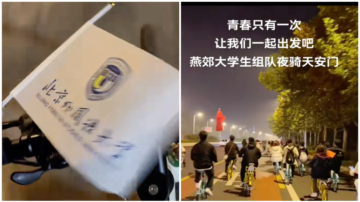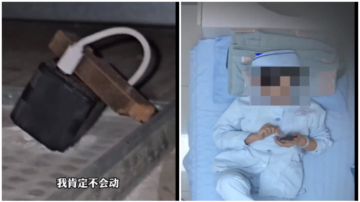【新唐人2014年05月09日讯】中国大陆在5.1长假期间,伴随着各地政府的各种救市政策,各地开展了五花大门的房地产促销活动,不过,成交价格和数量普遍惨淡,北京成交量同比大跌8成。外界认为,中国房地产崩盘已经开始。专家指出,作为中国经济支柱的房地产,房地产崩盘会导致中国经济节节败退,后果会比当年的日本和美国更惨。
经历了一季度楼市的冷清后,5.1长假成为各家房地产企业抢市的节点。开发商开始了营销大战,名车展示,外籍模特走秀、小丑表演,微信抽奖活动,应有尽有。
而在广州,从4月开始,房地产开发商推出“首付分期”或者“零首付”的楼盘不断增加,5.1长假期间,降价促销﹔1万抵5万、手持5万定金就可以签约等促销活动比比皆是。
同时,各地政府也开展了松绑限购,下调购买房入户标准等方式救市。
不过,大陆“中原集团研究中心”监测的54个城市数据显示,今年5.1假期新建住宅合计成交量,与去年同期相比大幅下滑47%,一线、二线、三、四线城市都明显下挫,降幅分别为40%、65%、32%。
北京、上海、广州、深圳四大一线城市成交量更是跌到冰点,北京等城市成交总量同比大跌近八成。
大陆财经评论家牛刀:“这个它在造势,搞一点甚么政策出来,试试看各方面反映,对于中国房地产那么大盘量,那些政策有甚么用呢,能够糊弄一点人去,没有用的,除非房子暴涨人家才会买,人家放那么多钱到那儿有甚用。”
中共国家发改委“城市和小城镇改革发展中心”,去年调查了12个省、区的156个地级市和161个县级市,发现90%以上的地级市,正在规划建设新城新区,规划人口达到34亿。也就是说这些规划出来的新城区,能住下全世界人口的一半。
深、沪两市126家房企公布的第1季度报告显示,其中77家出现净利润按年下滑﹔126家房企归属母公司净利润,与去年同期相比下滑6.36%,同时,负债和存货大幅增长,双双突破两万亿元人民币。
牛刀:“中国的房价是乱涨的,它并不是老百姓的购买力把它拖起来,完全是共产党滥发钞票把它拉起来的,不是一个正常的房价,房价降的越多,对老百姓越好,房租也会降低,房租降低对企业也有好处。”
清华经济管理学院中共党委书记杨斌:“中国的房价太高了,现在中国平均的商品房的房价已经超过美国别墅的房价。另外,中国是两极分化,有钱人出去买房子,没钱的人在国内都住不起。”
在中共特有的土地公有化制度里,土地成了地方政府生钱的活水源。财政部“财政科学研究所”所长贾康认为,“不动产业”是国民经济的一个支柱产业,政府当然要避免这个产业经受大起大落式的冲击。贾康说,政府不会坐视不动产业大起大落。
牛刀:“你要卖地可以啊,但是你建的房子要有人买啊,根本护不住的,政府绝对护不住,它要护的办法唯一就是印钞,那是个甚么感觉啊,中国甚么价格都比其他任何国家高得多,印钞就要通胀。”
贾康认为,中国楼市崩盘不能与美国和日本相比。他说,美国和日本,已经是从中等收入阶段“毕业”了的发达国家,美国进行一些调整后,较快的摆脱了危机状态,现在仍然是无可动摇的头号强国。日本经历20年的经济停滞,老百姓的国民福利却没有滑坡,照样过得比较滋润。但中国经济增速的可接受区间很狭窄,一旦滑出区间,局面会不可设想。
贾康表示,假设中国现阶段就出现楼市崩溃,中国很可能会跌进中等收入陷阱,贫富分化加剧,直接影响民生,而且很可能使经济问题政治化,进入乱局。
采访编辑/刘惠 后制/舒灿
China Experiences Dismal Housing Market
During the May 1 extended holiday weekend,
numerous real estate promotional activities took place
along with a variety of local government bailout
policies to save the market.
However, the sales volume has been poor.
Beijing´s total transactions fell 80 percent year on year.
It is generally believed that China's real estate bubble
has begun to burst.
Experts point out that real estate has been China's
economic pillar.
The real estate collapse will result in a financial
crisis in China worse than what Japan
and the United States have experienced before.
After the poor real estate performance in the first
quarter, high hopes for the market were placed
on the May 1 holiday.
Developers engaged in a marketing war with
luxury car displays, runway models,
clown performances, and lottery tickets.
In Guangzhou, real estate developers launched
"down payment by installments"
or "zero down payment" in April.
During the May 1 holiday, there were even promotional
markdown activities such as “get 10,000 yuan´s worth
for 50,000 yuan,” or “50,000 yuan down payment
seal´s the deal.”
Local governments have relaxed restrictions
on home buyers´ standards.
Centaline Group´s May 1 survey data of 54 cities
showed the total transactions for new housings fell
47 percent year on year.
Total transactions for first, second, and third/fourth tier
cities declined significantly by 40 percent, 65 percent,
and 32 percent respectively.
The four first-tier cities— Beijing, Shanghai, Guangzhou
and Shenzhen— had next to no transactions,
a fall of nearly 80 percent.
Niu Dao, financial commentator: "The promotion
policies are to test the water.
But, none of the policies will work for the massive
Chinese real estate market.
Unless housing prices skyrocket, no one will buy.
There is no point to invest money in housing now."
The National Development and Reform Commission
conducted a survey of 156 cities in 12 provinces and
found more than 90 percent of those cities are planning
to construct new Metro Districts to harbor
3.4 billion people—half of the world's population.
In the first quarter reports of 126 real estate companies
in Shanghai and Shenzhen, 77 had less net profit
year on year.
The total net profit of the 126 companies fell by 6.36
percent year on year.
The total liabilities and inventories have respectively
reached 2 trillion yuan.
Niu Dao: "China's housing prices are a mess.
The high prices were not determined by the people's
purchasing power, but rather by the CCP´s chaotic
money printing.
The real estate prices were not normal.
Housing prices ought to be reduced,
the more the merrier.
The rent should go down.
Lower rent is to the advantage of businesses, too."
Yang Bin, Chinese Communist Party Secretary
at the School of Economics and Management,
Tsinghua University: "China's housing prices
are too high.
Even an average house would cost more
than a villa in the United States.
There is also polarization in the market.
The wealthy will invest in housing overseas,
and the poor can´t even afford a place to stay local."
The CCP´s public ownership of land has become
a source of income for the local government.
Jia Kang is the Director of Fiscal Science Research
Institute, Ministry of Finance.
He believes that the regime will not allow the ups
and downs of a state economic pillar such as real estate
to impact the state economy.
Niu Dao: "You can sell the land.
But someone has to buy the house that´s built
on the land. The government cannot hold it.
The only way to hold the economy is to print money.
What does that mean?
Everything in China will cost more than
in any other country.
Printing money means inflation."
Jia Kang commented that China´s property market crash
cannot be compared with those in the U.S. and Japan.
He said both the United States and Japan, which are
already developed countries, have graduated
from the ‘middle income trap.’
Both countries have been able to adjust and recover
from the crisis.
However, China has a relatively narrow window
for economic growth.
Once the economy slides, the situation will
be unthinkable.
Jia Kang believes that should a property market crash
occur, China is likely to fall into the middle-income
trap—that is, an exacerbated wealth gap— which would
have a direct impact on the livelihood of the people,
and cause an even more politicized economy.
In other words, chaos will occur.
Interview & Edit/Liu Hui Post-Production/Shu Jie
经历了一季度楼市的冷清后,5.1长假成为各家房地产企业抢市的节点。开发商开始了营销大战,名车展示,外籍模特走秀、小丑表演,微信抽奖活动,应有尽有。
而在广州,从4月开始,房地产开发商推出“首付分期”或者“零首付”的楼盘不断增加,5.1长假期间,降价促销﹔1万抵5万、手持5万定金就可以签约等促销活动比比皆是。
同时,各地政府也开展了松绑限购,下调购买房入户标准等方式救市。
不过,大陆“中原集团研究中心”监测的54个城市数据显示,今年5.1假期新建住宅合计成交量,与去年同期相比大幅下滑47%,一线、二线、三、四线城市都明显下挫,降幅分别为40%、65%、32%。
北京、上海、广州、深圳四大一线城市成交量更是跌到冰点,北京等城市成交总量同比大跌近八成。
大陆财经评论家牛刀:“这个它在造势,搞一点甚么政策出来,试试看各方面反映,对于中国房地产那么大盘量,那些政策有甚么用呢,能够糊弄一点人去,没有用的,除非房子暴涨人家才会买,人家放那么多钱到那儿有甚用。”
中共国家发改委“城市和小城镇改革发展中心”,去年调查了12个省、区的156个地级市和161个县级市,发现90%以上的地级市,正在规划建设新城新区,规划人口达到34亿。也就是说这些规划出来的新城区,能住下全世界人口的一半。
深、沪两市126家房企公布的第1季度报告显示,其中77家出现净利润按年下滑﹔126家房企归属母公司净利润,与去年同期相比下滑6.36%,同时,负债和存货大幅增长,双双突破两万亿元人民币。
牛刀:“中国的房价是乱涨的,它并不是老百姓的购买力把它拖起来,完全是共产党滥发钞票把它拉起来的,不是一个正常的房价,房价降的越多,对老百姓越好,房租也会降低,房租降低对企业也有好处。”
清华经济管理学院中共党委书记杨斌:“中国的房价太高了,现在中国平均的商品房的房价已经超过美国别墅的房价。另外,中国是两极分化,有钱人出去买房子,没钱的人在国内都住不起。”
在中共特有的土地公有化制度里,土地成了地方政府生钱的活水源。财政部“财政科学研究所”所长贾康认为,“不动产业”是国民经济的一个支柱产业,政府当然要避免这个产业经受大起大落式的冲击。贾康说,政府不会坐视不动产业大起大落。
牛刀:“你要卖地可以啊,但是你建的房子要有人买啊,根本护不住的,政府绝对护不住,它要护的办法唯一就是印钞,那是个甚么感觉啊,中国甚么价格都比其他任何国家高得多,印钞就要通胀。”
贾康认为,中国楼市崩盘不能与美国和日本相比。他说,美国和日本,已经是从中等收入阶段“毕业”了的发达国家,美国进行一些调整后,较快的摆脱了危机状态,现在仍然是无可动摇的头号强国。日本经历20年的经济停滞,老百姓的国民福利却没有滑坡,照样过得比较滋润。但中国经济增速的可接受区间很狭窄,一旦滑出区间,局面会不可设想。
贾康表示,假设中国现阶段就出现楼市崩溃,中国很可能会跌进中等收入陷阱,贫富分化加剧,直接影响民生,而且很可能使经济问题政治化,进入乱局。
采访编辑/刘惠 后制/舒灿
China Experiences Dismal Housing Market
During the May 1 extended holiday weekend,
numerous real estate promotional activities took place
along with a variety of local government bailout
policies to save the market.
However, the sales volume has been poor.
Beijing´s total transactions fell 80 percent year on year.
It is generally believed that China's real estate bubble
has begun to burst.
Experts point out that real estate has been China's
economic pillar.
The real estate collapse will result in a financial
crisis in China worse than what Japan
and the United States have experienced before.
After the poor real estate performance in the first
quarter, high hopes for the market were placed
on the May 1 holiday.
Developers engaged in a marketing war with
luxury car displays, runway models,
clown performances, and lottery tickets.
In Guangzhou, real estate developers launched
"down payment by installments"
or "zero down payment" in April.
During the May 1 holiday, there were even promotional
markdown activities such as “get 10,000 yuan´s worth
for 50,000 yuan,” or “50,000 yuan down payment
seal´s the deal.”
Local governments have relaxed restrictions
on home buyers´ standards.
Centaline Group´s May 1 survey data of 54 cities
showed the total transactions for new housings fell
47 percent year on year.
Total transactions for first, second, and third/fourth tier
cities declined significantly by 40 percent, 65 percent,
and 32 percent respectively.
The four first-tier cities— Beijing, Shanghai, Guangzhou
and Shenzhen— had next to no transactions,
a fall of nearly 80 percent.
Niu Dao, financial commentator: "The promotion
policies are to test the water.
But, none of the policies will work for the massive
Chinese real estate market.
Unless housing prices skyrocket, no one will buy.
There is no point to invest money in housing now."
The National Development and Reform Commission
conducted a survey of 156 cities in 12 provinces and
found more than 90 percent of those cities are planning
to construct new Metro Districts to harbor
3.4 billion people—half of the world's population.
In the first quarter reports of 126 real estate companies
in Shanghai and Shenzhen, 77 had less net profit
year on year.
The total net profit of the 126 companies fell by 6.36
percent year on year.
The total liabilities and inventories have respectively
reached 2 trillion yuan.
Niu Dao: "China's housing prices are a mess.
The high prices were not determined by the people's
purchasing power, but rather by the CCP´s chaotic
money printing.
The real estate prices were not normal.
Housing prices ought to be reduced,
the more the merrier.
The rent should go down.
Lower rent is to the advantage of businesses, too."
Yang Bin, Chinese Communist Party Secretary
at the School of Economics and Management,
Tsinghua University: "China's housing prices
are too high.
Even an average house would cost more
than a villa in the United States.
There is also polarization in the market.
The wealthy will invest in housing overseas,
and the poor can´t even afford a place to stay local."
The CCP´s public ownership of land has become
a source of income for the local government.
Jia Kang is the Director of Fiscal Science Research
Institute, Ministry of Finance.
He believes that the regime will not allow the ups
and downs of a state economic pillar such as real estate
to impact the state economy.
Niu Dao: "You can sell the land.
But someone has to buy the house that´s built
on the land. The government cannot hold it.
The only way to hold the economy is to print money.
What does that mean?
Everything in China will cost more than
in any other country.
Printing money means inflation."
Jia Kang commented that China´s property market crash
cannot be compared with those in the U.S. and Japan.
He said both the United States and Japan, which are
already developed countries, have graduated
from the ‘middle income trap.’
Both countries have been able to adjust and recover
from the crisis.
However, China has a relatively narrow window
for economic growth.
Once the economy slides, the situation will
be unthinkable.
Jia Kang believes that should a property market crash
occur, China is likely to fall into the middle-income
trap—that is, an exacerbated wealth gap— which would
have a direct impact on the livelihood of the people,
and cause an even more politicized economy.
In other words, chaos will occur.
Interview & Edit/Liu Hui Post-Production/Shu Jie








